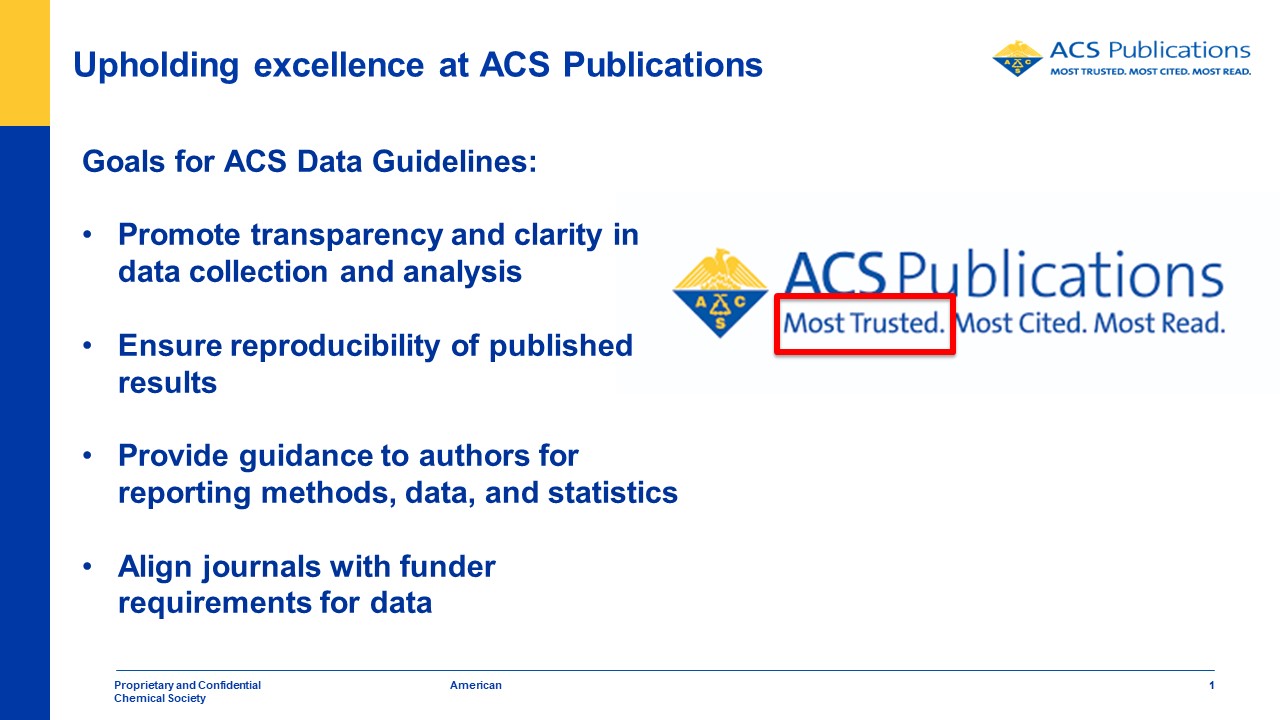MODERATOR:
Anne Coghill
Senior Manager, Peer Review Services, Global Journals Development
American Chemical Society
Washington, DC
SPEAKERS:
Michael Friedman
Acting Co-Director of Publications and Journals Production Manager
American Meteorological Society
Boston, Massachusetts
Kerry Kroffe
Director, Editorial Services
PLOS
San Francisco, California
Shelley Stall
Senior Director, Data Leadership
American Geophysical Union
Washington, DC
Alyson Weidmann
Managing Editor
American Chemical Society
Washington, DC
REPORTER:
Erin Landis
Vice President of Publications
American Gastroenterological Association
Bethesda, Maryland
Given the burgeoning amount of data that exists in the scientific enterprise and in the world at large, many journals are now aware of the need to create a policy around the handling, archiving, and dissemination of data. However, the roadmap for creating such a policy remains unclear for many. In this session at the 2019 CSE annual meeting, four experts on the creation and implementation of data policies for journals shared their experience and advice for making the process less intimidating.
Shelly Stall, from the American Geophysical Union (AGU), explained that her organization has a specific position statement on data that expresses that documented, credited, and preserved data ultimately advances science. She also shared data from a survey conducted by the Belmont Forum that demonstrated the motivating factors for scientists to share their data, which include increasing the visibility and impact of their research and public benefit.
Stall’s presentation largely focused on the FAIR Data Principles, which were developed by stakeholders from academia, industry, funders, and publishers who wanted to improve the infrastructure around the reuse of scholarly data. FAIR stands for making data Findable, Accessible, Interoperable, and Reusable. A full explanation of these principles can be found at https://www.force11.org/group/fairgroup/fairprinciples. AGU is a member of COPDESS, the Coalition for Publishing Data in the Earth and Space Sciences, as a means to enable the FAIR project. There are over 100 signatories of COPDESS. COPDESS seeks commitments from researchers, publishers, and authors to the FAIR principles to help elevate the transparency and reproducibility of data.
Michael Friedman, from the American Meteorological Society (AMS), discussed his organization’s experience with implementing the FAIR project (AMS is also a signatory of COPDESS). He explained that AMS took a more deliberate approach, given the smaller size of their community and the internal structure of their governance process. AMS is implementing the FAIR principles and taking advantage of the built-in flexibility because some aspects would have been more difficult than others to implement. The fact that the FAIR commitment statement is more aspirational than prescriptive has been an advantage. This approach allowed AMS to implement what was feasible on a schedule that works for them, while still agreeing and complying with the overall goals of the initiative. Coincidentally, AMS was amid revising their data policy at the time FAIR was launched; hence, FAIR informed the revisions they made to their policy.
Using FAIR as their guide, AMS drafted a revised data policy. After internal review, the policy was open for public comment. After reviewing the feedback, the final policy was approved by the AMS Board on Data Stewardship and received final approval by the AMS Council. Friedman noted that ultimately there were some differences between AMS’s data policy and FAIR, but the overarching goals were aligned.
Kerry Kroffe, from PLOS, described his organization’s experience with establishing a data policy. PLOS has been a proponent of data sharing since it was first launched in 2003. In their original data policy, PLOS required that authors share their data upon request, once the paper was published. In 2014, they strengthened their policy to require that all data is accessible and reusable at the time of publication. Additionally, authors must include a data availability statement in their manuscripts; since 2014, more than 115,000 published papers contain such statements.
Kroffe noted that PLOS faced several challenges implementing this stronger data policy, including the various norms of data sharing and tools among disciplines, a cultural shift toward data sharing being the norm versus the exception, and an increase in personnel resources among staff, the editorial boards, and reviewers. Also of importance, Kroffe emphasized, was the need to provide clear guidance around the data policy and to involve the scientific community.
Alyson Weidmann rounded out the session by sharing the American Chemical Society’s (ACS) experiencing with creating a data policy. ACS’s goals for developing such a policy were multifold, not the least of which was to ensure the reproducibility of published results. Weidmann shared a survey published in Nature where, of 1,500 scientists in biology and chemistry polled, over 80% could not reproduce reported results. To address concerns of reproducibility, ACS convened a taskforce that comprised Weidmann, editors-in-chiefs of three ACS journals, and other publishing staff.

The taskforce developed a policy that contained four primary tenets: 1) the proper use of statistical tests and explanation of methods; 2) the use of database identifiers for reagents and materials, and the deposition of new materials in repositories; 3) the reporting of sources for all reagents and validation where possible; and 4) the promotion of transparency and accuracy in data representation and visualization. ACS intends to expand their data policy to all 56 titles and develop guidelines for other core areas of chemistry, beyond biological data. They also hope to strike a balance with their scientific community by being informative and clear about the new standards without being too prescriptive.
The session concluded with a lively Q&A segment.
